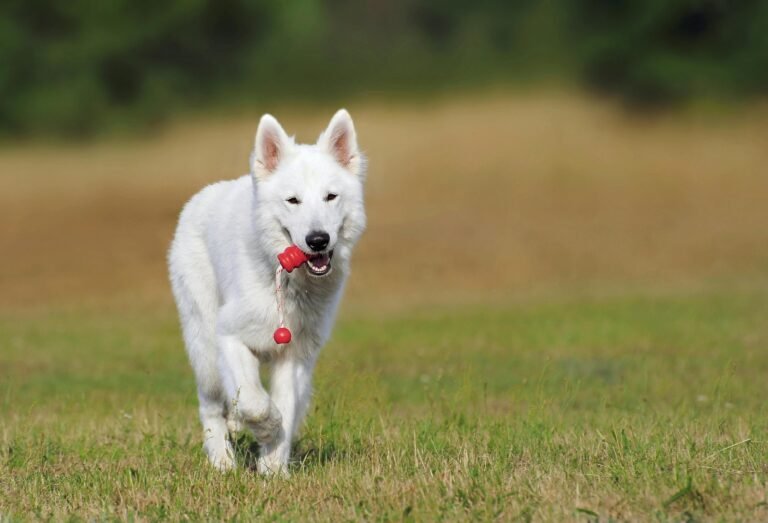
Bringing a puppy into your home is an exciting experience, but it also comes with responsibilities. A healthy and happy puppy grows into a confident, loving dog. To ensure your furry friend thrives, you need to focus on their physical, mental, and emotional well-being.
A Nutritious Diet
Choosing the Right Puppy Food
- Look for high-quality puppy food rich in protein, healthy fats, and essential nutrients.
- Avoid fillers like corn and artificial additives.
Portion Control and Feeding Schedules
- Feed your puppy the right amount for their age and size.
- Divide meals into 3-4 portions daily to avoid overeating and promote digestion.
Regular Exercise
Age-Appropriate Activities
- Young puppies don’t need intense exercise.
- Short walks, gentle play, and free-roaming in the yard work best.
Benefits of Physical Stimulation
- Exercise helps maintain a healthy weight, strengthens muscles, and prevents behavioral issues like excessive barking or chewing.
Mental Stimulation
Interactive Toys and Games
Puzzle toys and treat dispensers keep your puppy entertained while encouraging problem-solving.
Teaching New Tricks
Training sessions are fun and mentally engaging. Start with simple commands like “sit,” “stay,” and “come.”
Socialization
Introducing Your Puppy to Other Dogs
Arrange playdates with vaccinated, friendly dogs to help your puppy develop social skills.
Exposing Them to Different Environments
Take your puppy to parks, sidewalks, and pet-friendly places to make them comfortable in diverse settings.
Routine Veterinary Care
Vaccinations and Deworming
Ensure your puppy gets all core vaccinations on time. Regular deworming protects them from parasites.
Regular Health Checkups
Schedule vet visits every few months during the first year to monitor growth and health.
Also read: Puppy Teething Troubles: Tips and Tricks
Grooming and Hygiene
Bathing and Brushing
- Bathe your puppy only when needed to avoid drying out their skin.
- Brush their coat regularly to keep it clean and shiny.
Dental Care for Puppies
Introduce dental chews or puppy toothbrushes early to maintain oral hygiene and prevent gum diseases.
Creating a Safe Environment
Puppy-Proofing Your Home
Remove hazards like toxic plants, electrical cords, and small objects they could swallow.
Safe Spaces for Rest and Play
Provide a cozy bed and a designated play area where your puppy feels secure.
Training Basics
Importance of Obedience Training
Training lays the foundation for a well-behaved adult dog. It helps with communication and builds trust.
Positive Reinforcement Techniques
Reward good behavior with treats, praise, or playtime to encourage learning.
Building a Bond
Spending Quality Time Together
Dedicate time each day for play, cuddles, or a leisurely walk to strengthen your bond.
Understanding Your Puppy’s Needs
Learn to read your puppy’s body language to understand when they’re happy, scared, or unwell.
Dealing with Stress and Anxiety
Recognizing Signs of Stress
Watch for signs like excessive barking, pacing, or hiding. These could indicate discomfort or anxiety.
Using Calming Techniques
Try soft music, calming sprays, or a gentle massage to ease their stress.
Providing Comfort
Comfortable Bedding
A soft, supportive bed helps your puppy rest peacefully.
Ensuring Temperature Regulation
Keep your puppy warm during cold weather and provide shade during hot days.
Puppy Playtime Tips
Types of Toys That Engage Puppies
Soft chew toys, squeaky balls, and interactive games keep your puppy entertained.
The Importance of Supervised Play
Always monitor playtime to prevent accidents or chewing on unsafe items.
Monitoring Growth and Development
Keeping Track of Milestones
Note when your puppy loses baby teeth, gains weight, or learns new skills.
Recognizing Potential Health Issues
Stay alert to signs like limping, loss of appetite, or unusual behavior, and consult your vet if needed.
Raising a puppy is a rewarding journey filled with joy and learning. By focusing on proper nutrition, exercise, training, and love, you’ll ensure your puppy grows into a healthy and happy companion. Remember, consistency and patience are key to building a lifelong bond with your furry friend.
FAQs
- How often should I feed my puppy?
Puppies need 3-4 small meals daily until they are six months old. - When should I start training my puppy?
Begin training as early as 8 weeks with simple commands and positive reinforcement. - How can I keep my puppy entertained?
Use interactive toys, play games, and engage in short training sessions. - What vaccinations does my puppy need?
Core vaccines include distemper, parvovirus, rabies, and adenovirus. Consult your vet for a detailed schedule. - How do I handle puppy biting?
Redirect biting to chew toys, and avoid encouraging rough play to prevent this habit.




